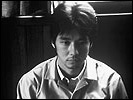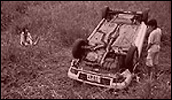Canary
- Year
- 2005
- Original title
- Kanaria
- Japanese title
- カナリア
- Director
- Cast
- Running time
- 132 minutes
- Published
- 15 June 2005



by Jasper Sharp
The national trauma of the 1995 sarin gas attacks on the Tokyo underground system by renegade members of the Aum cult informed the content of a number of movies towards the end of the millennium, with Tatsuya Mori's chilling documentaries A and A2, Shinji Aoyama's stark police thriller An Obsession, and Takahisa Zeze's metaphysical pink film Tokyo X Erotica among the most notable.
Ten years after this seemingly random tragedy and memories of the event still linger like an open sore, unmentioned yet unforgotten. Though the trials of the perpetrators seem to be reaching some kind of resolution as the wheels of justice grind slowly on, there's been rather less follow up on what has happened to those immediately implicated, either those victims still suffering from the aftershock of the attacks, or those members of the cult subsequently abandoned to return to normal life after the true nature of the organisation became apparent. It is the latter who form the focus of Akihiko Shiota's latest film.
Though the cult here is named Nirvana, Shiota's look at the plight of children raised in the compound of a religious cult, later disbanded after a murderous gas attack on the Tokyo subway, was clearly inspired by the real-life killings of Aum Shinrikyo. It also covers similar territory to his earlier Harmful Insect (Gaichu, 2001), focusing on the lives of children cast adrift in a world where the guidance of adults counts for little.
After being removed from the clutches of the Nirvana cult where he has been kept secluded from normal society, 12-year-old Koichi (Ishida) is placed into the hands of child welfare by the authorities. Rebellious, angry, and defiant, he is refused a home by his maternal grandfather, who recognises in him similar character traits to that of his own estranged daughter and cult member Michiko (Koda). The grandfather does take in his younger sister Asako however, leaving Koichi all alone in custody.
His father long dead, Koichi breaks out of care and sets off to reclaim his sister, with the somewhat impractical goal of taking her away to live together and return to a distant utopian past when the family unit was still intact. On the run, he meets with the similarly-aged Yuki (Tanimura), a young girl from a broken home who has suffered at the hands of an abusive father. With nothing as such to tie her to the small backwater town where she has grown up, Yuki agrees to accompany him on his quest, offering sexual services to a lonely old man in order to raise the train fare to Tokyo.
During their journey, however, Koichi's aggressive and strange behaviour threatens to drive Yuki away, as he finds himself unable to break free of the religious dogma deeply engrained in him at the rough hands of the Nirvana cult. Freed from an environment where one's individual identity is forcibly submerged to that of the collective, at an age when children are stumbling to find their own individual place within the world, Koichi is suddenly pitched into deciding just what his role in society exactly is.
By tackling the topical subject of the reconfiguration of the family unit and the growing schism between the worlds of adults and children (cf. Antenna, Battle Royale), Shiota once again proves himself to be one of a rare handful of directors who really have something crucial to say about contemporary Japanese society. It is clear that Canary's references to Aum cult are only a starting point to raise more general questions about the socialisation of the next generation. Shiota's strengths as a director lie within his ability to construct such a frank filmic allegory within a rigorously depicted and highly believable cinematic setting, drawing out the realistic aspects of his world in lengthy unbroken handheld takes with the aid of cameraman Yutaka Yamazaki, who also lensed Hirokazu Kore'eda's After Life and the not dissimilarly-themed Distance.
For various reasons aside from its shared cinematographer, the work of Kore'eda springs to mind at numerous points when watching Canary, particularly his highly-regarded Nobody Knows, which competed at Cannes in 2004. Comparing the two works is a rather telling exercise, giving a good indication of the mechanism by which the internationalisation of Japanese cinema (indeed, that of any country) takes place, and prompting the question of whether, for all the advances in distribution technologies and the diversification of public tastes, we are really in a much better situation now than we were in the 1950s or 60s, when only a handful of directors were internationally visible.
With Kore'eda returning to Cannes on a per film basis, one might get the feeling that he is operating in complete isolation in what he does, whereas in reality he is but one of a number of directors exploring very similar avenues. Like Kore'eda, Shiota makes films for the rather select arthouse market in Japan. Their films do not court the masses in their own country, and are pretty heavily reliant on attention from overseas. But while Kore'eda is held up as Japan's ambassador to the world of international arthouse cinema, supporting figures such as Shiota remain pretty much ignored. With the DVD market focused on the more exploitative side of Japanese cinema, with dozens of titles from new brand-name directors like Takashi Miike clogging up the release schedules, one wonders by what channels such intriguing indie directors as Kunitoshi Manda, Nobuhiro Suwa, Naomi Kawase or Yutaka Tsuchiya are ever going to find a broader audience outside their own national boundaries?
This is not intended to call into question the quality of Kore'eda's work, just to draw attention to the fact that there are plenty of others in Japan doing equally interesting things. Whether Canary is a better film than Nobody Knows is beside the point. They are two very different takes on quite similar subject matter. Whereas Kore'eda utilised the distant, observational style of a documentary and kept his children isolated in one location, Shiota's film, though equally realist in its shooting style, adopts a more mythical template. Its narrative takes the form of a quest, leading its central characters, and the audience, to certain revelations about themselves.
Both stories have their foundations in the bare bones of true-life fact. Both have been expanded more fully into credible filmic worlds by their directors, worlds in which the daily details are instantly recognisable, but the point of view is substantially different from what we are used to. The view that Kore'eda presents us is of the mundane details that we, as adults, are familiar with, of fridges, convenience stores, and electricity bills, but that for children are just non-utilitarian background fixtures to their environment.
Shiota, in contrast, shows us a side of the world that we know exists but lies outside of most of our experience, and shows it to us through the naïve, uncomprehending eyes of a child. A foggy encounter with a lesbian couple suffering their own relationship difficulties midway through the film lends a vaguely surreal aspect to the tale, while Koichi's flashbacks to life within the compound where he is removed from his mother's love and meted out violent punishments for any behaviour that goes against the grain would also seem so chillingly absurd were it not so rooted in the known facts of the Aum case.
Like Nobody Knows, Shiota's film benefits from some startling performances from its young cast members, the nuances of whose expressions contain a spontaneity not yet hammered out by the melodramatic requirements of Japanese television and film acting. Ultimately Canary falls just shy of brilliance though. Unlike Kore'eda's more even-handed approach, it suffers from occasional shifts in pacing and tone, with the heavy-handed symbolism of the coda and the real stylistic clunker in the choice of the closing pop song counting as minor black marks against it. Nonetheless, Canary has to represent the pinnacle of Shiota's body of work up until now, a work so near-perfectly conceived and precise as to make it essential viewing.